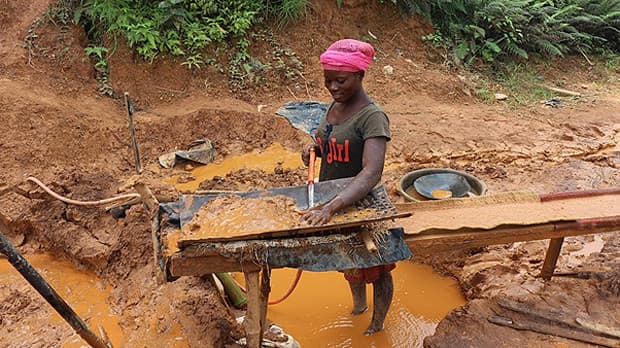YAOUNDÉ, Cameroon – Catholic Bishops in Ghana have called out the government of President Nana Akufo-Addo for what they termed its “weak, inconsistent, and corrupt” efforts to stop illegal mining, known as ‘Galamsey.’
“Galamsey” is a slang word derived from the Ghanaian words for “gather” and “sell,” and is used to refer to illegal and often abusive mining methods.
During a press conference September 11, the president of the bishops’ conference of Ghana, Bishop Matthew Kwasi Gyamfi of Sunyani, said that the “complicity of political leaders [and] some chiefs, and the lack of political support, have further exacerbated the problem, allowing illegal mining to go unchecked.”
He expressed deep concern about the “persistent and alarming levels of environmental degradation caused by illegal mining.”
One major mineral being exploited from Ghana is gold. The West African nation recently regained its position as Africa’s top gold producer, with a 32 percent increase in production in 2022. The country’s gold output was reported at around four million ounces.
In 2019, gold contributed to over 93 percent of the country’s mineral revenue, with other minerals such as manganese, bauxite, and diamonds making up much smaller portions.
Galamsey constitutes that darker side of this gold boom. Approximately one million Ghanaians are involved in galamsey, supporting around 4.5 million people. The Ghana Chamber of Mines estimated that in 2016, illicit miners smuggled $2.3 billion worth of gold out of the country, depriving the state of crucial revenue.
Since 2009, Catholic bishops in Ghana have been consistently vocal about the environmental damage caused by the practice. Documents and sessions devoted to the topic have included “The scourge of Galamsey: A Threat to Our Nation’s Future,” “Galamsey: A call to conscience and Action,” Protecting our Environment, Protecting our Future,” and “We Must End Galamsey to Save Our Country.”
Gyamfi said in his September 11 press conference that the persistent calls by the bishops for an end to Galamsey demonstrate how seriously they take the practice of illegal mining that has “unleashed devastating consequences on our country’s ecosystem, water bodies and communities.”
Referring to Pope Francis’ encyclical Laudato Si, the cleric called on all Ghanaians to care for “our common home, the earth, as stewards of creation.”
“We have a moral responsibility to guard the environment for current and future generations,” he said, insisting that “the indiscriminate activities of illegal miners continue to undermine this responsibility.”
The bishops’ statement read at the press conference said: “We wish to state that Ghanaians can no longer tolerate the lip service of the government of whatever color in the fight against Galamsey. We call for action, not tomorrow but now and right from this press conference, all hands must get on board.”
The bishops urged the government to “take immediate and decisive action” to end the practice.
“We urge the government to stop the lip service in fighting Galamsey by employing all available means to halt illegal mining activities,” the bishops said.
“This includes enforcing existing laws, holding perpetrators accountable, and ensuring that those involved in illegal mining face the full force of the law without fear or favor,” their statement said.
The bishops stressed the importance of a comprehensive educational campaign, urging the media, civil society organizations, and religious bodies to lead efforts in raising public awareness about the long-term consequences of illegal mining.
“Communities must be empowered to understand the devastating effects of Galamsey,” they said, highlighting the critical role of awareness in combating environmental destruction.
In their statement, the bishops called for the restoration of all areas affected by illegal mining in the West African nation. They urged the government to prioritize the reclamation of destroyed lands and the restoration of polluted water bodies.
“This process must involve local communities, led by the chiefs, and be transparent to ensure the recovery of the environment,” they stated, recommending a strong temporary moratorium on all licensed community mining activities.
The press conference was also attended by other stakeholders, including the Media Coalition Against Illegal Mining.
Its founder, Ken Ashigbey, told journalists that “if our leaders don’t take action, we’ll be left to eat clay due to illegal mining.”
He said the media will be working “in tandem with the labor unions” and announced that there will be demonstrations to force the government to act.
He said the media will begin to carry out investigative reports to name those responsible, and could go as far as taking offenders to the International Criminal Court.
The country’s National Commission for Civic Education (NCCE) has also joined in the flurry of condemnations, saying in a Sept. 12 statement that illegal mining must be treated as a serious crime.
“Illegal mining is a direct existential threat to our environment, public health, and the prosperity of our country. It is not just an environmental issue but a serious criminal activity that undermines national efforts toward sustainable development and environmental governance,” the statement reads.
The bishops called on mining companies, big and small, to engage in sustainable mining practices.
“Mining must be carried out responsibly and sustainably, with strict adherence to environmental regulations,” they said.














